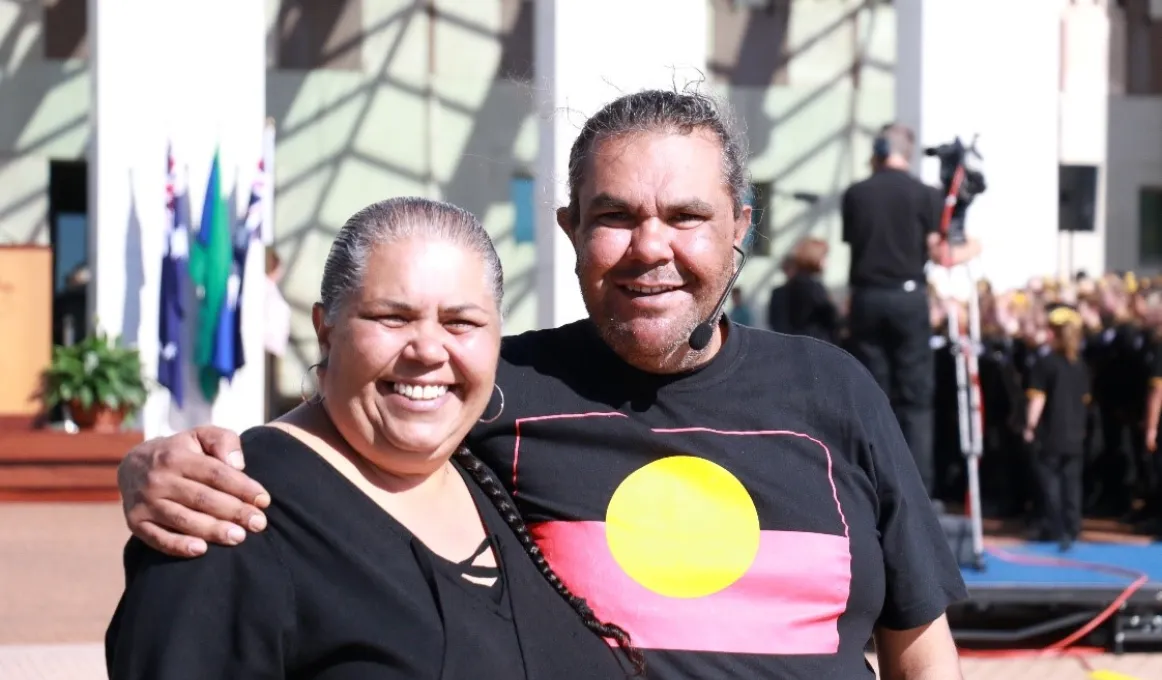Ngunnawal Elders reflect on the 30th birthday of Parliament House

Aunty Tina and Uncle Adrian after the Welcome to Country and smoking ceremony.
Leading the Welcome to Country and a smoking ceremony to mark the 30th anniversary of the opening of Australia’s Parliament House on 9 May, Ngunnawal Elders and siblings, Aunty Tina Brown and Uncle Adrian Brown reflect on their personal journey and their connection to the iconic building.
‘Today we celebrate this anniversary together,’ remarked Aunty Tina, ’Welcoming all to our ancestral lands of the Ngunnawal.’
After the Welcome, Uncle Adrian commenced the smoking ceremony, burning native plants to produce smoke to ward off bad spirits, to acknowledge ancestors and pay respect to the land and sea of country.
Since its opening on 9 May in 1988, Parliament House in Canberra has been the meeting place of the Parliament of Australia, providing the setting for ceremonial functions, hosting visiting dignitaries, and for a variety of political, community and social events.
Thirty years ago, as the Queen used two ceremonial keys to symbolically open the doors of the great House, Aunty Tina and Uncle Adrian (as children) were part of a vocal group of protestors calling for land rights.
Today, they are just as passionate about improving outcomes for Aboriginal and Torres Strait Islander peoples and recognise the benefit of working with government to ensure initiatives such as Closing the Gap deliver positive outcomes.
‘It’s a place for all Australians, and in Indigenous Affairs they have now been working closely to engage with the community,’ Aunty Tina said.
After anniversary formalities concluded, Aunty Tina reflected on the importance of the protest movement and the sacrifices elders before her have made to improve her life and the life of her children.
‘I have the utmost respect for all our previous elders, today for the work that they did to pave that way for me and Adrian to be here today to conduct this ceremony. They did all that so that we can be recognised, have pathways onto employment, pathways into training and adequate housing and health.’
Echoing Aunty Tina’s message, Uncle Adrian spoke of the legacy their Elders have left and the opportunities he has today because of them but recognised that there is still a lot of work left to be done.
‘I was only 12 years old and I struggled at that period of my life. No acknowledgement of my people, who we were and where we came from. That legacy that our Elders have left for us has changed our future. It’s becoming brighter and stronger, but in my own mind I still think it’s a slow process. It’s taken a long time and it’s still going to take a long time. It’s going to be another 20-50 years before we’re truly acknowledged as First Nations people.’
‘If we are going to make the effort, we should truly make the effort. Don’t take one step and not take the second step.’
Find out more
Find out more about PM&C’s Indigenous Affairs programs on the Culture and Capability web site.
Visit the Parliament of Australia web site for what’s on.